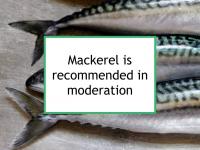Mackerel is an excellent source of the marine omega-3 fatty acids docosahexaenoic acid (DHA) and eicosapentaenoic acid (EPA), as well as coenzyme Q10 (CoQ10). Mackerel is also a good source of choline, selenium, vitamin B6, vitamin B12, and vitamin D. Consumption of fatty fish has been found to reduce the risk of coronary heart disease.
Consumption of dried mackerel was shown in one study to improve the learning ability of laboratory mice, apparently by increasing the level of the marine omega-3 fatty acid docosahexaenoic acid (DHA) in their brains. Eating fatty fish such as mackerel has been found to be associated with reduced risks of leukemia, multiple myeloma, and non-Hodgkin lymphoma, as well as renal cell, endometrial and prostate cancer.
Mercury in mackerel
Generally speaking, the benefits of consuming fatty fish are thought to outweigh the potentially detrimental effects of the toxins from pollution and other sources that tend to accumulate in their adipose tissue. Atlantic mackerel and Alaskan Atka mackerel are considered low-mercury fish and can safely be consumed up to two times per week (assuming six-ounce servings). Spanish mackerel (from the south Atlantic) have a high enough mercury content that they should be consumed far less often. King mackerel and other mackerel from the Gulf of Mexico have been reported to have high levels of mercury and other heavy metals and should be avoided.
Breast cancer-related effects of eating mackerel
Human studies
Relatively high fatty fish consumption has been shown to be associated with reduced risk of breast cancer and improved survival, although not all studies are in agreement. Several studies have found that higher omega-3 to omega-6 fatty acid ratios are associated with reduced risk of breast cancer; consuming mackerel would tend to improve the ratio for most women. There are no studies that specifically focus on mackerel and breast cancer risk or survival.
Marine omega-3 fats
Mackerel is an abundant source of EPA and DHA, which have chemopreventive properties. EPA and DHA have been shown to inhibit proliferation of breast cancer cells in the laboratory and reduce tumor development in animal models of breast cancer. In one experiment, higher omega-3 to omega-6 fatty acid diets reduced mammary gland density in mice, which in turn reduced carcinogen-induced mammary tumor development.
Fish oil (which typically consists primarily of EPA and DHA) has been shown to inhibit early stages of mammary tumor development in a mouse model of HER2-positive (HER2+) breast cancer. DHA has also been demonstrated to reduce bone metastasis in a mouse model of breast cancer.
In addition, marine fatty acids have been found to enhance the therapeutic effects of tamoxifen and chemotherapy drugs such as doxorubicin and paclitaxel.
Additional comments
We recommend against consuming all but modest amounts of smoked mackerel, dried mackerel, salted dried mackerel, or mackerel pâté since such high-sodium preserved fish foods have been associated with increased risks of gastric, colorectal and other cancers.
Pan frying mackerel has been shown to release carcinogenic heterocyclic amines (HCAs) in concentrations high enough to affect human health. Population studies have reported that consumption of fried fish is associated with increased risk of breast cancer.
Below are links to recent studies concerning this food and its components. For a more complete list of studies, please click on mackerel.
